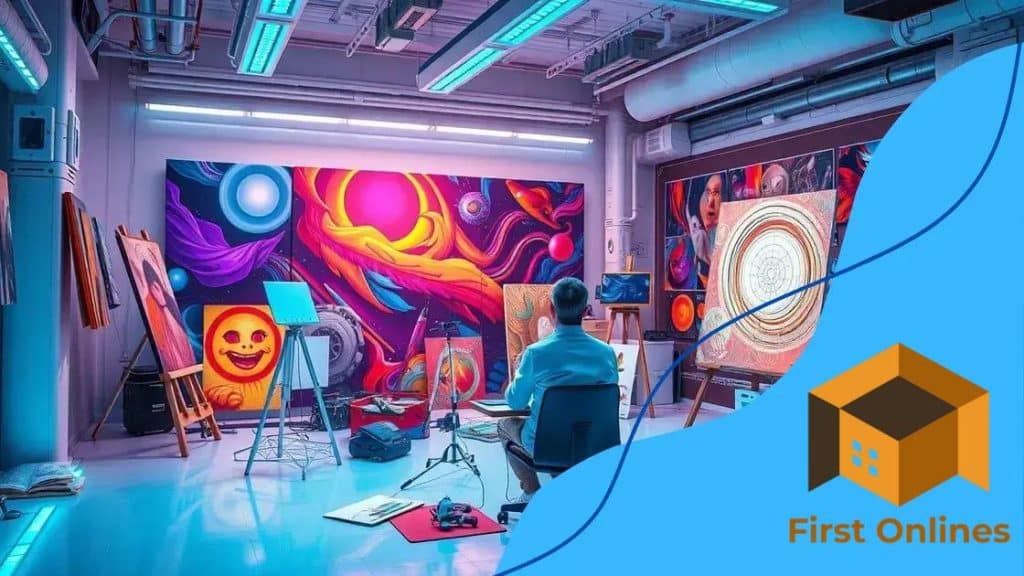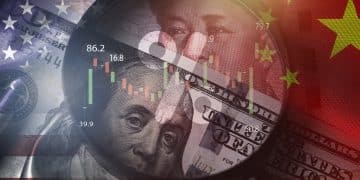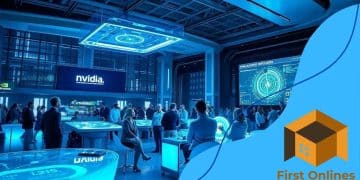The impact of AI in the creative industries in 2025

Anúncios
The impact of AI in the creative industries in 2025 will redefine artistic processes, enhance collaboration, and create personalized experiences while presenting challenges related to ethics and quality control.
The impact of AI in the creative industries in 2025 is poised to be revolutionary, shaping how artists and creators operate. Have you ever wondered how technology can elevate your favorite art forms? Let’s dive into this fascinating evolution.
Anúncios
How AI is transforming content creation
AI is not just a buzzword; it’s becoming a pivotal force in how we create content. In recent years, the capabilities of artificial intelligence have expanded significantly, and this has transformed the landscape of content creation across various industries. Let’s explore how AI is redefining this essential process.
Enhanced Creativity
With tools powered by AI, creators can explore new horizons in their work. These tools help enhance creativity by offering new suggestions and inspirations. Imagine having an assistant that generates ideas based on current trends!
Speed and Efficiency
Another advantage of AI in content creation is its ability to streamline workflows. AI algorithms can quickly process data, allowing for faster production times. This efficiency frees up valuable time for creators to focus on perfecting their craft.
Anúncios
Personalization
AI also enables personalization in content generation, tailoring materials to specific audiences. By analyzing user data, AI can help creators develop content that resonates with their target demographics. This leads to more engaging and relevant content.
Automation of Repetitive Tasks
- AI can automate repetitive tasks that consume a lot of time.
- It helps in managing social media posts and scheduling.
- AI tools can handle data analysis and reporting, freeing creators to focus on content quality.
- This automation allows for a more strategic approach to content creation.
The incorporation of AI in content creation presents numerous opportunities. From image and video editing to writing compelling copy, AI tools can enhance every step of the content production process. With such tools, creators can bring their visions to life with unprecedented efficiency and effectiveness. The future of content creation is bright as AI continues to evolve and integrate more into our workflows.
The role of AI in enhancing creativity
The role of AI in enhancing creativity is becoming increasingly significant in various fields. Creatives are using AI tools to push the boundaries of their imagination and production capabilities. By integrating artificial intelligence into their workflows, artists and content creators find new avenues for expression.
AI as a Creative Partner
AI acts as a collaborator for many artists. These systems can generate ideas, assist in brainstorming, and even suggest edits. This allows creators to explore concepts they might not have considered alone. AI can analyze trends, providing insights that help shape the final outcome.
Expanding Artistic Capabilities
With advanced algorithms, AI can help enhance existing skills. For example, painters can experiment with new styles using AI-generated patterns, while writers might receive prompt suggestions that spark innovative storylines. This synergy between creativity and technology fosters an environment where new forms of art can flourish.
Collaboration Across Disciplines
In many cases, AI encourages collaboration between different artistic fields, breaking traditional boundaries. Musicians, filmmakers, and graphic designers can come together through shared AI tools, creating multidisciplinary works that stand out. This approach not only enhances creativity but also diversifies the types of content being produced.
Benefits of AI in Creativity
- Increases the speed of the creative process.
- Offers personalized feedback to artists.
- Provides access to a wealth of resources and inspiration.
- Encourages experimentation and risk-taking in art.
The transformative effects of AI in creative spaces are only beginning to be realized. As technology advances, its role in enhancing creativity will continue to evolve, providing even more innovative solutions for artists everywhere. The partnership between humans and AI is paving the way for the future of creative expression.
AI tools that are changing the game

AI tools that are changing the game in content creation are transforming how artists and creators approach their work. These innovative technologies provide unprecedented access to resources and capabilities, making the creative process more efficient and impactful. Let’s explore some of the main tools making waves in the industry.
Content Generation Tools
These tools take input ideas and turn them into full articles or stories. Using complex algorithms, they can produce written content that aligns with the creator’s vision. For example, platforms like OpenAI’s GPT-3 can generate text based on prompts given by a user, aiding writers in overcoming creative blocks.
Image and Video Creation
AI isn’t limited to just text. Tools like DALL-E and RunwayML allow users to create stunning visuals and videos from simple text descriptions. This capability opens doors for artists and designers to quickly visualize their ideas without spending hours on initial drafts. These AI tools can also enhance existing content by providing editable graphic elements or suggesting edits.
Music Composition
Music creators also benefit from AI. Tools such as AIVA can compose original music tracks in various styles, allowing musicians to experiment with melodies and arrangements. These tools can analyze existing songs to create similar tunes, thus broadening the creative palette for composers.
Benefits of AI Tools in Creativity
- They provide instant feedback on ideas.
- Enhance productivity by automating tasks.
- Allow for experimentation with minimal risk.
- Create a collaborative environment for teams.
AI tools not only streamline the creative workflow but also empower artists to push their boundaries. By providing smart suggestions and automating mundane tasks, these technologies free up time for creators to focus on what truly matters—their art. As these tools continue to advance, the future of creativity will undoubtedly be more vibrant and exciting.
Challenges of integrating AI in creative fields
Integrating AI in creative fields comes with several challenges. While these technologies offer exciting possibilities, they also present obstacles that artists and creators must navigate. Understanding these challenges is crucial for harnessing the full potential of AI in creativity.
Resistance to Change
One significant barrier is the resistance to change within traditional creative communities. Many artists may fear that AI will replace their jobs or diminish their artistic value. This fear can create a divide between those who embrace technology and those who prefer traditional methods. The apprehension about losing creativity to machines often holds back the adoption of AI tools.
Quality Control
Another challenge is maintaining quality control in AI-generated content. While AI can produce impressive results, it does not always hit the mark. Creators must carefully review and edit AI-generated work to ensure it aligns with their vision. This additional step can slow down the creative process, making it less efficient.
Ethical Considerations
There are also ethical concerns surrounding AI in creative fields. Questions about copyright, plagiarism, and ownership of AI-generated works are prevalent. When using AI tools, artists must navigate these legal complexities to protect their work and their rights.
Dependence on Data
- AI systems rely heavily on data to function effectively.
- If the data is biased or incomplete, the output will reflect those flaws.
- This dependence on data can limit creativity and lead to repetitive results.
- It’s essential for creators to have a critical eye when using AI-generated content.
Navigating these challenges is part of the evolving landscape of creativity. As artists find ways to integrate AI tools into their processes, they can also advocate for more responsible and ethical AI use in their fields. This balance between technology and tradition will shape the future of creative expression.
Future trends in AI and creativity
Future trends in AI and creativity are set to reshape the artistic landscape significantly. As technology continues to advance, the integration of artificial intelligence into creative processes will become increasingly sophisticated. Let’s examine some of the key trends that are emerging.
Personalized Content Creation
One trend is the move toward personalized content. AI can analyze user preferences and produce tailored art, music, or writing that resonates with individual tastes. By leveraging algorithms, creators can engage audiences on a deeper level, creating experiences that feel custom-made.
Collaborative A.I.
Another emerging trend is the development of collaborative AI systems that work alongside artists. These systems act as creative partners, offering real-time suggestions and adjustments to enhance the creative process. Whether in music composition or digital art, AI’s role as a collaborator is gaining traction.
Expansion of AI Art Forms
AI is also paving the way for new art forms that blend traditional creativity with technology. Generative art, which uses algorithms to create beautiful visuals, is becoming more mainstream. This allows artists to explore new dimensions and create works that wouldn’t be possible through manual methods.
Ethical AI Practices
- As AI becomes more prevalent, ethical considerations will take center stage.
- Artists will need to navigate copyright and ownership issues regarding AI-generated content.
- Responsible AI use will be crucial in maintaining the integrity of creative works.
- Transparency in AI processes will foster trust among creators and audiences.
The convergence of AI and creativity presents exciting opportunities and challenges. By staying informed about these trends, artists can harness the power of AI while remaining true to their vision. The future holds great promise for those willing to embrace this evolving landscape of artistic expression.
FAQ – Frequently Asked Questions about AI in Creative Industries
How does AI enhance creativity in the arts?
AI enhances creativity by providing artists with new tools and inspirations, allowing them to explore ideas and produce innovative works.
What are some challenges of using AI in creative fields?
Challenges include ethical considerations, quality control, and potential resistance from traditional artists who may fear AI will replace their roles.
What trends are emerging in AI and creativity?
Emerging trends include personalized content generation, AI collaboration in art, and new forms of generative art.
Can AI tools replace human artists?
No, AI tools are designed to assist and enhance human creativity, not to replace it. They act as partners in the creative process.





